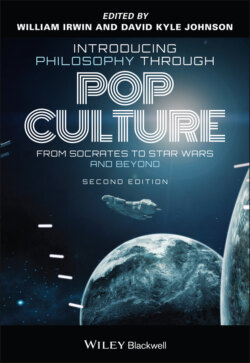Читать книгу Introducing Philosophy Through Pop Culture - Группа авторов - Страница 12
Оглавление
Part I
What is Philosophy?
Introduction
The word “philosophy” is often confused with the words “opinion,” “theory,” or “approach”–as in, “What is your philosophy of life?” or “Our philosophy is never to be undersold!” As a result, some students have mistaken ideas about what a philosophy class is. “Can you even give a wrong answer in a philosophy class? Isn’t it just whatever you think?” Well, yes you can, and no it’s not.
The word “philosophy” comes from the Greek language and means “love of wisdom.” Philosophers seek truth and wisdom above all else. The questions for which true answers are most important, but most elusive, form the core of philosophy. What is the nature of reality? What is knowledge, and how can one attain it? Is there a God? What is the nature of good and evil? How can I live a good life? How should we govern ourselves? What is the meaning of life? So how do philosophers seek answers to these questions? Are there really answers? Or is whatever anyone thinks just “true for them” because they have a “right to their opinion?” What role does philosophy play in society? And what attitude does philosophy require?
In Chapter 1, William Young argues that philosophy and the TV show South Park share some common aims. Like the philosopher Socrates (469‐399 BCE), South Park is charged with corrupting the youth, inappropriately challenging moral norms, and being a social nuisance. But the accusations are unfounded for both Socrates and South Park. The accusers are actually the corruptors; for example, parents corrupt the youth when they leave their kids to be raised by television without educating them about what they are seeing. Thankfully South Park, like Socrates, teaches us to draw our own conclusions–not merely accept the consensus of the crowd–and to reach those conclusions by considering the perspectives of others. Clearly, Young argues, South Park is not mindless and harmful; the show, like philosophy, is a gadfly, “an annoying pest that goes around ‘stinging people’ with…challenging questions and critical reflections so as to keep them intellectually awake and on their toes.”
Philosophers’ appetite for truth is insatiable, but they do not always agree. To solve their disputes they use logic. In Chapter 2, Robert Arp takes examples from South Park to teach some of the basics of logic including the structure of arguments, the differences between good and bad arguments, and the distinction between inductive and deductive arguments. The lesson concludes with common logical fallacies, illustrated by South Park for comedic effect. In one classic episode, for example, the cartoon version of Johnnie Cochran commits the red‐herring fallacy by suggesting that Chef must not have written the Alanis Morissette song “Stinky Britches” because Chewbacca spent most of his time on Endor: “If Chewbacca lives on Endor, you must acquit.”
South Park is not the only show that plays philosopher. Late night talk show hosts can be gadflies as too. In Chapter 3, David Kyle Johnson uses Stephen Colbert to teach us about the philosophical attitude. Relativism (what Colbert calls “wikiality”) and intuitionism (What Colbert calls “truthiness”) are contrary to the endeavor of philosophy. More importantly, Johnson enlists Colbert to dispel a myth that holds back almost every philosophy course–the myth that everyone has a right to their opinion on every subject. Attempts to end philosophical discussion with appeals to “a right to my opinion” only reveal a disregard for truth and a desire to protect entrenched beliefs. Real philosophers must be willing to give up disproven beliefs and embrace the truth.
